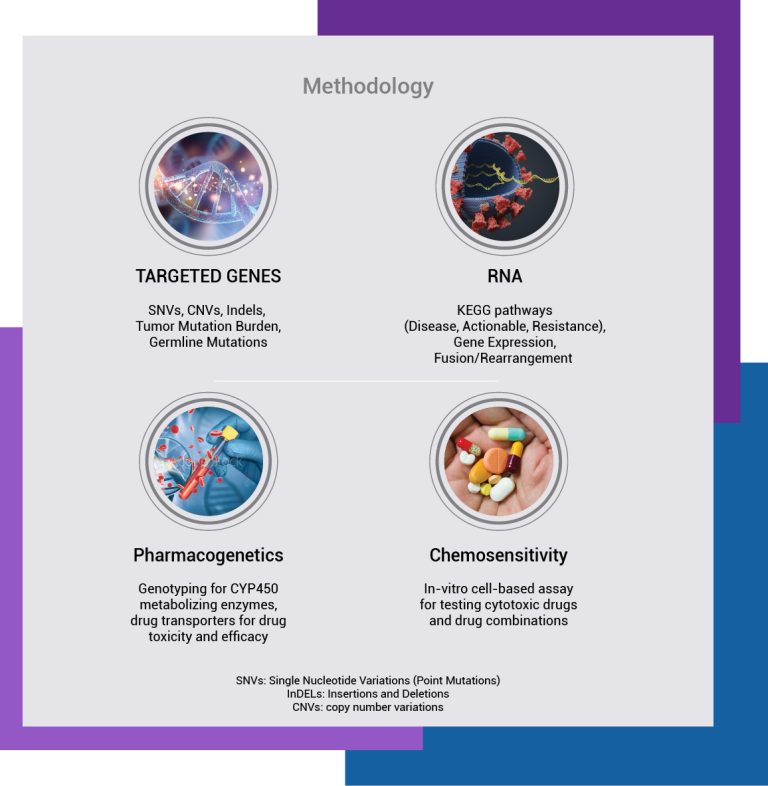When confronted with advanced cancer
Think About
Integrative Actionable Tumor Investigations
Exacta® is a multi-analyte and multi-coordinate investigation that integrates genomic analysis to cover alterations in >592 genes and perturbations in the expressions of >20,000 genes to unravel actionable mutations and pathways propelling an individual patient’s cancer.
Why Personalized Treatment ?
Cancer is a disease of the genes. The cancer in each patient is as unique and the individual and has a distinct molecular configuration unlike any other. Illustratively, no breast cancer in two patients is alike at the molecular level. However, the conventional ‘standard of care’ treatments are based on population studies, which overlook the unique genetic landscape and complex dynamics of the tumor. As a result, patients are at risk of failed therapies or aggressive relapse. It is thus imperative that the deepest molecular architecture of an individual patient’s tumor is studied comprehensively before deciding any treatment plan. We have devised an analytical solution ‘Exacta’ that offers the most comprehensive tumor analysis in treatment guidance.
The Advantages of Exacta®
Exacta® can identify the most efficacious drugs for every individual cancer and thus enables highly sophisticated treatment strategies beyond conventional perspective, even for difficult, refractory cancers.
When
Should I Consider Exacta® ?
First line
therapy has
failed
Cancer
has
relapsed
Cancer is
high-grade / metastatic
Newly diagnosed patients with difficult cancers
Cancers with limited/no standard options
The risk of therapy failure is high
Exacta® is clinically proven
The RESILIENT Trial
RESILIENT (CTRI/2018/02/011808) was a single arm, open label, phase II/III study to test if label agnostic therapy regimens guided by Encyclopedic Tumor Analysis (ETA) can offer meaningful clinical benefit for patients with relapsed refractory metastatic (r/r-m) malignancies. Patients with advanced refractory solid organ malignancies where disease had progressed following ≥2 lines of systemic treatments were enrolled in the trial. Patients received personalized treatment recommendations based on integrational comprehensive analysis of freshly biopsied tumor tissue and blood. The primary end points were Objective Response Rate (ORR), Progression Free Survival (PFS) and Quality of Life (QoL).
ORR
42.9%
CBR
90.5%
PFS
93.9%

Exacta® is clinically proven
The RESILIENT Trial
RESILIENT (CTRI/2018/02/011808) was a single arm, open label, phase II/III study to test if label agnostic therapy regimens guided by Encyclopedic Tumor Analysis (ETA) can offer meaningful clinical benefit for patients with relapsed refractory metastatic (r/r-m) malignancies. Patients with advanced refractory solid organ malignancies where disease had progressed following ≥2 lines of systemic treatments were enrolled in the trial. Patients received personalized treatment recommendations based on integrational comprehensive analysis of freshly biopsied tumor tissue and blood. The primary end points were Objective Response Rate (ORR), Progression Free Survival (PFS) and Quality of Life (QoL).
ORR
42.9%
CBR
90.5%
PFS
93.9%
Exacta®
Parameters and Methods of Analysis:
Exacta® (Blood - Based)
- Cell-free DNA (411 genes)
- Gene rearrangements (RNA)
- Gene amplification/CNV
- KEGG pathways: Kyoto Encyclopedia of Genes and Genomes
- Gene expression (20,800 genes)#
- Therapy relevant ICC markers (mTOR, VEGFR1, VEGFR2, EGFR, VEGFA)
- Pharmacogenetics guidance
- MMR
- Blood tumor mutational burden
- Circulating Tumor Cells (CTCs)
- Cytotoxic therapy guidance (in vitro chemosensitivity on C-TACs)
CNV: Copy Number Variation • C-TACs: Circulating Tumor-Associated Cells • KEGG: Kyoto Encyclopedia of Genes and Genomes # Exosomal
Want to delve a little deeper?
If you have questions or would like to know more about test performance, download the brochure.
We’re here to assist you
If you have any questions or want to learn more, please contact us or visit our FAQs.
